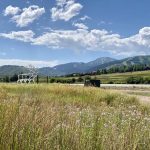Summit County councilor worried about Park City’s plans for contaminated soils
Official drafts statement raising concerns about repository location, process

A member of the Summit County Council has raised questions about a concept under consideration at City Hall to build a facility along the S.R. 248 entryway to store soils containing silver mining-era contaminants, a rare appearance by a County Courthouse official in a Marsac Building issue.
County Councilor Roger Armstrong is a Park City resident and drafted the statement as a private citizen rather than as an elected official. He said in an interview he anticipates the County Council and the Summit County Health Department will receive a briefing about the facility, known as a repository, shortly. The statement indicates Armstrong, who once unsuccessfully campaigned for mayor of Park City, is not seeking elected office in the city.
“To be even clearer, I am not suggesting the City’s plan is a good one, terrible one, or something in-between. The purpose of this is to urge Parkites to request critical information from the City before this initiative moves further. Processes concerning approvals of hazardous waste landfills typically take years, not months,” Armstrong says in the statement. “If the City previously came to Parkites and asked if we wanted a hazardous waste facility to be opened and operated at our entry way, it would have led to a robust discussion with experts providing insight as to public health risks, costs and administration burdens. These facilities are highly regulated for good reason, they are toxic.”
The repository would be used by City Hall to store materials excavated during the construction of municipal projects, including a planned arts and culture district. The City Hall application is under review by the Utah Department of Environmental Quality. Park City historically was a silver-mining community and there are contaminants dating from that era in various places.
“The Arts and Culture parcels are some of the hottest soils in Park City. They are the historic home of a mine tailings pond, a railroad turnaround facility, a ramp for offloading materials onto rail cars, a power substation, and a gas station,” Armstrong says.
The county councilor briefly covers work years ago by a City Hall commission that studied contaminated soils issues and some of the details of the application to the Department of Environmental Quality. He says he did not have knowledge of the discussions until recently.
“Opening and operating a hazardous waste landfill concerns me. I admit I heard nothing about the City’s plan to establish a contaminated soils landfill. It appears their first meeting on the subject was in June 2020, and the County was focused on COVID-19 management and the Hideout annexation dispute. I missed it,” he says.
Armstrong questions whether Park City’s elected officials have the information they need.
“I would suggest the City Council has not been fully informed about all of the very significant health issues, economic issues, and potential liability issues of this initiative. It warrants profound expertise and vetting. It appears that has not happened,” he says.
He notes the proposed location of a repository is close to trails, playing fields and the Park City Heights development as well as public buildings like the Park City Ice Arena.
“The location of this facility is essentially in a wind tunnel – among the windiest in Park City and it blows in the direction of most of those facilities. The city has already been dumping material there and people report that material frequently blows out. The critical question remains: Is it toxic?” he says.
Armstrong, meanwhile, discusses the prospect of transporting the contaminated soils to a Tooele County facility. City Hall contends such an operation would be costly, would burden that community and would increase vehicle emissions as the materials are transported between the two locations.
“Moving soils to Tooele is expensive but what are the economic and non-economic costs and liabilities of this particular path? Are we putting a price on public health and welfare?” he says. “The Arts+Culture planning process has been problematic. There has been significant public concern about costs and the soils remediation costs are going to be extremely significant. Cost cutting should not take precedence over human health or project expedience.”
Sundance move would hit Park City economy
As Sundance starts a process that could result in the festival leaving Park City, there is expected to be a renewed focus on the economics of the community’s largest special event.
Analysis: Sundance move would make Hollywood ending less likely for Park City arts district
Sundance indicated it has started a process that could result in a relocation of the festival from Park City, something that creates more uncertainty about the future of an arts district.

Support Local Journalism

Support Local Journalism
Readers around Park City and Summit County make the Park Record's work possible. Your financial contribution supports our efforts to deliver quality, locally relevant journalism.
Now more than ever, your support is critical to help us keep our community informed about the evolving coronavirus pandemic and the impact it is having locally. Every contribution, however large or small, will make a difference.
Each donation will be used exclusively for the development and creation of increased news coverage.










